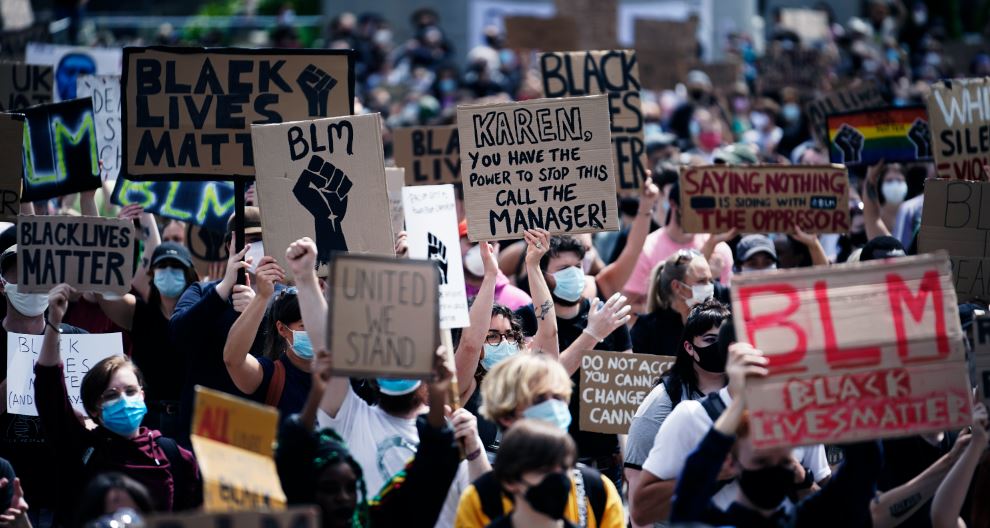There are a lot of things that left-wingers do better than right-wingers. They write better songs, make better art, and are far better at protesting. Many of those protests are small and relatively inconsequential, as the person who used to spend his days standing outside Defra dressed as a badger could attest. But others are large, worldwide, and provoke a bigger response. The Extinction Rebellion protests fall into this category, as do the current Black Lives Matter demonstrations.
When protests get to this size many on the right start looking for ways to discredit them. This often seems to come more from an instinctive distrust of protests than it does from views on the issues being demonstrated about. It is not hard to see what breeds this instinctive distrust in right-wingers. To somewhat oversimplify it, conservatives don’t like change and libertarians don’t like being told what to do.
The recent Black Lives Matter protests in London and around the UK provoked exactly this response from those on the right. After building up smaller grievances, such as the futility of protesting something in another country or highlighting the few instances of violence (though setting aside the concerns about mass protests during a time of social distancing), criticism on the right settled, as it invariably does, on the argument that the protestors want more than just to ‘end racism’ or some other noble goal. What they are really seeking, so the argument goes, is radical and dangerous changes to the system: “We all agree with ending racism, but these people want to tear down the institutions that keep us safe and make us better off. This protest is just a front for replacing capitalism with communism”.
Sometimes, this is self-evidently the case. Extinction Rebellion did not just want to draw attention to the climate crisis, they had a set of very particular and radical ideas on how to solve it. They advocated severely authoritarian measures to limit personal consumption, dramatic state intervention, and radical reform of the democratic process. Greta herself even famously declared continuous economic growth – the key to bringing people out of poverty – a ‘fairy tale’.
However, where those who believe in capitalism as a force for good had good reason to be sceptical and critical of the Extinction Rebellion movement, the same does not apply for the Black Lives Matter protests. While there may be evidence of fringe actors using it as a vehicle for system change the same accusation cannot be levelled at the movement as a whole.
BLM is a decentralised movement, in which there will always be many strands and motivations. In this case, when forming our response we should look for the thread that brings it together rather than picking the strands that confirm our biases.
The perception that BLM is on the whole a radical neo-Marxist political movement is just not backed up by evidence. The biggest concern cited is the campaign to ‘Defund the Police’, but once you dig into what this means in practice it becomes a lot less about abolishing state security services and a lot more about police forces having more accountability and transparency, and being more rooted in the communities they are tasked with protecting. The slogan might not help, but since when did libertarians and conservatives disagree with these aims? In fact, libertarians have been making similar arguments for a long time.
Being motivated by an instinctive distrust of protests leads many on the right to jump on minority actions to discredit whole movements, which limits their ability to listen to and work with protestors who they agree with, to help make the world a better place.
Another example of this can be seen in the parallel furore around statues. Right-wing Twitter accounts were quick to jump on reports of a ‘campaign’ to remove the Harold Wilson statue in Huddersfield, despite the fact that these reports were grounded in a single anonymous tweet. This all takes away from the very reasonable argument that we should replace statues of prominent slave traders with people we can admire. Both our first woman Prime Minister and the first black woman to become an MP should certainly be in the running.
Some protests are primarily aimed at dangerous and radical system upheaval, and those who believe in the power of capitalism to improve all of our lives should push back in these instances. But in the case of BLM, while people we disagree with may use the protests to push their own agenda, it is possible to heed the key message of the protest – that black lives matter – without giving way to the other aspects of their world view. It is imperative that we do not get lazy and reactionary in our assessment of protests, and end up rejecting important movements for no good reason. Believing that black lives matter does not a communist make.
Click here to subscribe to our daily briefing – the best pieces from CapX and across the web.
CapX depends on the generosity of its readers. If you value what we do, please consider making a donation.


